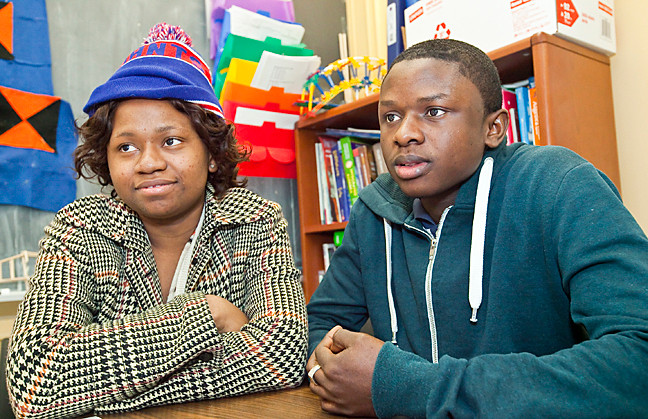Immigrant students have high hopes for ‘dream’ bill
Fatmata Bangura, a senior at the ELLIS Preparatory Academy who immigrated from Freetown, Sierra Leone in 2011, wants to be a lawyer one day. But passing state Regents Exams is not the only obstacle for the 20-year-old woman, whose education in Sierra Leone was described as spotty by an ELLIS administrator.
Ms. Bangura said her green card is in the possession of her estranged father. With the deadline for her to apply for U.S. citizenship fast approaching, navigating the system is a daunting task — one that may prevent her from receiving state funds even if she does get on the path to law school in the future.
“I want to go, but I don’t have the money,” Ms. Bangura said, “[My friends] say if you don’t have documents, you cannot go to college. I was like, really?”
Ms. Bangura said faculty at ELLIS, the city’s first school dedicated to serving immigrant students, have already helped with both her academics and family life. Advocates say a state Dream Act for undocumented students to receive state funds for college expenses would also help people like Ms. Bangura.
Earlier this year, chances the state legislature will pass the law received a boost when state Senate Co-Majority Leader Jeff Klein announced his support for the legislation. While other issues, notably universal preschool and the minimum wage, have since eclipsed the Dream Act in public debate, advocates and educators are hoping the bill will come into force after years of debate.
“Without that legislation, it is harming society at large,” said Jeremy Heyman, an ELLIS counselor focusing on college access and other issues. “It’s a huge detriment to students, being able to fund their time in college.”
Mr. Heyman added that the challenges of being an undocumented student start before college is on the horizon.
“We’ve had a lot who were undocumented who left before they graduated,” he said. “Part of it is they were very frustrated and realized what they’d face before they left.”
The counselor said the school has graduated 60 students since its inception in 2008, with a minority of ELLIS’ student body consisting of undocumented pupils. The city’s Department of Education does not customarily inquire about students’ citizenship status during the enrollment process.
The City University of New York is among organizations seeking to assist undocumented students while state and federal governments debate the issue. The university offers resources to help students apply for “deferred action,” a policy President Barack Obama initiated in 2012 that lets some immigrant students receive temporary legal status.
Last spring, state Senator Adriano Espaillat organized a protest vote by the Senate Latino Conference against the education, labor and family budget because it omitted the Dream Act.
“For undocumented immigrants, the daily injustice of our existing system is a chief cause of economic inequality, and limits their social mobility regardless of hard work and determination,” Mr. Espaillat said in his most recent comments on the subject, following President Obama’s State of the Union address.
Mr. Klein’s January announcement that he and the three other members of his Independent Democratic Conference will support the Dream Act came after Republicans who co-lead the senate blocked the bill in the past. Mr. Klein also said eight Democratic senators have withheld support from the act.
But he sounded an optimistic note about the legislation’s chances this session, adding that the state could fund its Tuition Assistance Program, known as TAP, with revenues from casinos going up in coming years.
“I was always looking to figure out a way to have a dedicated funding stream,” Mr. Klein said of assistance for undocumented students. “In essence, what we would be doing is giving undocumented students the ability to get TAP.”
At ELLIS, while Ms. Bangura’s future is full of uncertainty, a classmate in possession of a green card said he has been accepted to several state schools.
Sekou Magassouba’s status allows him to fill out federal forms that are mandatory for receiving state aid as well as a variety of other college funds for now.
“After college, I can find a job anywhere around the world,” said the 20-year-old from Conakry, Guinea, who plans to study computer science.






